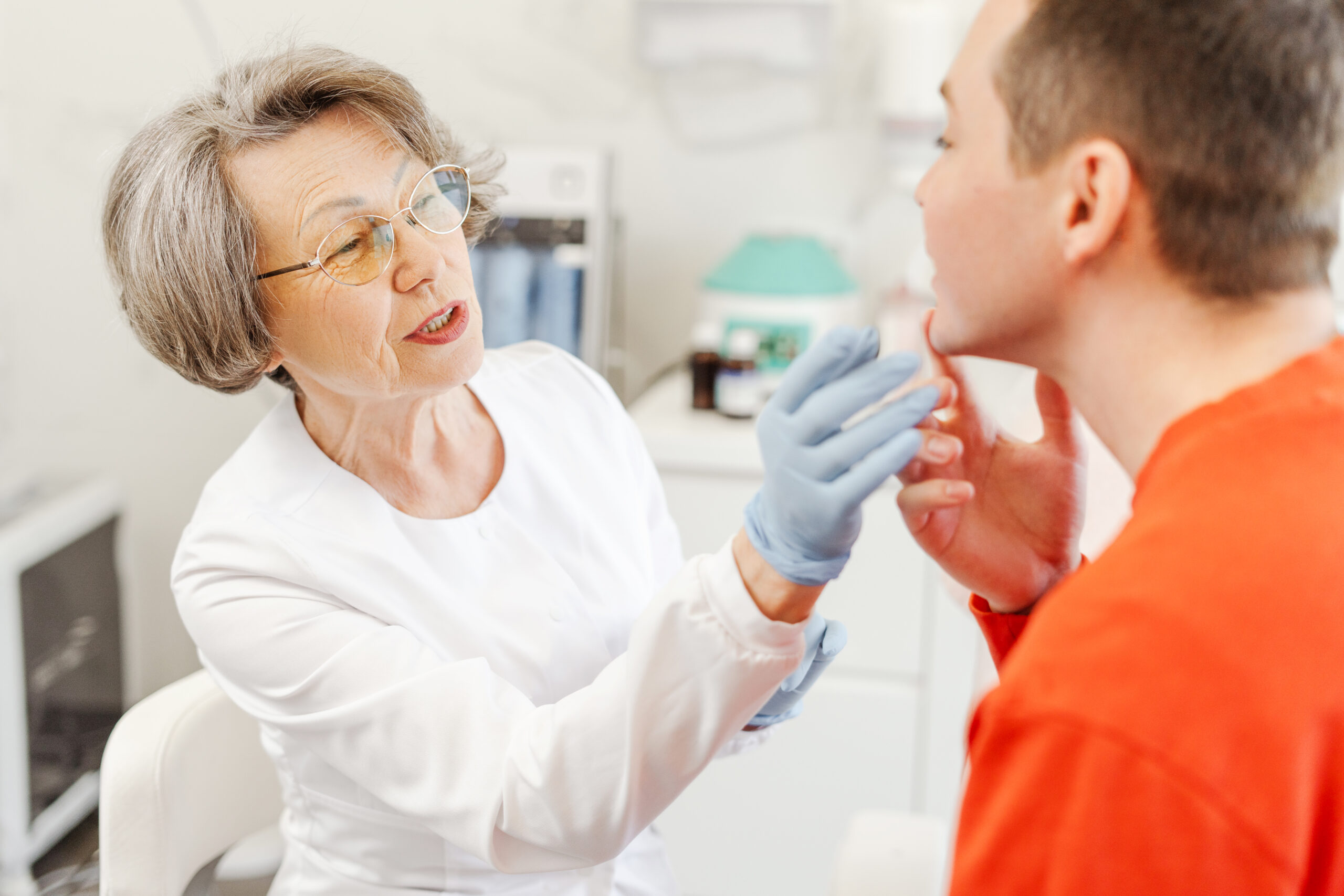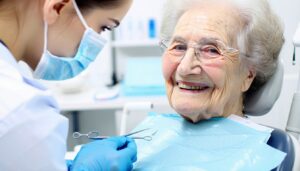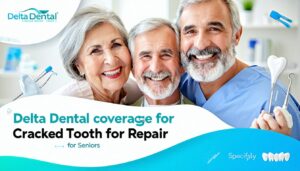Understand oral cancer risk
Medicaid oral cancer screening can be one of the most critical tools you have to safeguard your oral and overall health. Oral cancer poses a serious threat—particularly because many cases go undetected until they reach advanced stages. According to the Centers for Disease Control and Prevention (CDC), approximately 60% of oral cancer cases are identified at a later stage, which can make treatment more intensive and outcomes more uncertain (CDC). By choosing a proactive approach and taking advantage of routine examinations, you are investing in your well-being and giving yourself the best chance at early detection.
Early detection often makes a decisive difference in whether oral cancer can be managed or cured. Research indicates that Medicaid enrollees who visit a dentist regularly have lower rates of advanced oral cancer diagnoses (NCBI). Simply put, the more frequently you receive comprehensive screenings, the higher your likelihood of catching any abnormalities in their earliest phases. This precautionary effort matters if you want a better chance at effective treatment, lower costs, and peace of mind.
Why oral cancer often goes unnoticed
Many individuals do not realize how subtle oral cancer can be in its initial stages. Sometimes, the symptoms may look like minor mouth sores or represent mild discomfort you might attribute to a variety of non-serious conditions. Because of this, oral cancer can remain undiagnosed for months, silently progressing without overt warning signs. Even more concerning, many folks forego routine dental exams, which are the primary opportunities to catch oral cancer early. Studies from the Oral Cancer Foundation show that only about 60% of Americans see a dentist in any given year, leaving a significant portion of the population at risk (Oral Cancer Foundation).
Some of the challenges that contribute to delayed diagnosis include:
- Lack of awareness around the specifics of oral cancer symptoms
- Limited or inconsistent insurance coverage leading to fewer dental visits
- Busy schedules and life responsibilities taking priority over routine checkups
- Fear or anxiety around potential findings
By prioritizing a Medicaid oral cancer screening regimen, you become more prepared to identify and address subtle signs before they escalate.
Potential warning signs
To fully grasp how crucial regular checkups are, it helps to know which red flags to look for between visits. While professional screenings are significant, self-awareness also serves as a vital layer of prevention. Some early signs that warrant prompt attention include:
- Persistent mouth sores that do not heal within two weeks
- Unexplained lumps or thickened areas on the tongue, gums, or cheek lining
- White or red patches in the mouth
- Chronic sore throat or a sensation of something caught in the back of your throat
- Difficulty chewing, swallowing, or speaking
- Sudden changes in the fit of dentures
If you notice any of these symptoms, schedule an appointment for evaluation as soon as possible. Remember, early detection can alter the course of your treatment for the better.
Explore Medicaid coverage benefits
Medicaid plays a pivotal role in making preventative oral health services, including oral cancer screenings, more accessible to individuals. By covering significant aspects of diagnostic and treatment procedures, Medicaid helps ensure you can receive vital care without overwhelming financial strain. Yet, Medicaid coverage policies vary by state, so it is important to understand how they might apply to you. Even if Medicaid in your state does not fully reimburse adult dental services, notable exceptions sometimes exist for essential screenings.
Overview of coverage and expansions
The Affordable Care Act (ACA) extended Medicaid coverage to millions of Americans, improving access to essential healthcare services. These expansions intended to bridge coverage gaps, offering broader support for preventive services that received an “A” or “B” grade from the U.S. Preventive Services Task Force (Prevent Cancer Foundation). However, oral cancer screening guidelines present a unique challenge. While the ACA mandates coverage for a variety of preventive services, not all forms of adult oral healthcare see the same robust requirements across states.
As a Medicaid enrollee, you often have coverage for:
- Routine dental visits, depending on your state’s allowances
- Basic diagnostic services, including oral exams and potential biopsies
- Follow-up treatments, such as referrals to specialists
At times, states may implement additional coverage for early detection initiatives. If you have questions about which screenings and treatments Medicaid covers, contact your insurance provider or consult with a Medicaid-friendly dental office that can clarify your eligibility. You can also explore medicaid eligibility guidance to get personalized assistance on how to benefit from your plan.
The impact of the ACA
Although the ACA successfully broadened Medicaid coverage, some state-specific plans predate the legislation. Plans established before 2010 might lack full coverage for certain preventive services recommended by the U.S. Preventive Services Task Force. Meanwhile, an ongoing legal case, Braidwood Management Inc. v. Becerra, may alter the zero cost-sharing mandate for preventive services in the future (Prevent Cancer Foundation). Until new rulings take effect, however, you are generally entitled to coverage for the preventive services outlined by law.
For you, this means that while Medicaid offers a wide safety net, complexities in coverage remain. You may need to verify if routine dental exams, biopsies, or additional tests are fully covered, partially covered, or only covered when coded as medically necessary. Regularly checking policy updates helps you remain informed about any modifications that might affect your coverage.
State variations in coverage
Medicaid guidelines differ not just on a federal level, but state by state. Some states have robust adult dental benefits that include coverage for oral cancer screenings, while others only cover emergency dental procedures. Barriers arise when individuals lack clarity on which category a preventive procedure like a screening falls under. The good news is that:
- Federal guidelines require states to at least provide certain dental services, including medically necessary treatments
- Some states have expanded coverage to incorporate screenings for high-risk individuals
- Retroactive eligibility often allows you to receive Medicaid coverage for services you needed during the three months before your application, if you were eligible in that timeframe (Facing Our Risk)
By proactively reviewing each state’s Medicaid page or talking to a representative, you can better understand your eligibility and optimize your plan to protect your oral health. Meanwhile, a practice that accepts Medicaid can help you navigate these complexities more smoothly.
Experience Vivid Dental Raleigh
Beyond the formalities of insurance policies, having a trusted dental practice that accepts Medicaid can transform the way you manage your oral health. At Vivid Dental Raleigh, we focus on delivering high-tech, modern dentistry solutions that cater to both your comfort and your long-term well-being. Our approach underscores the supportive environment, individualized plans, and comprehensive care necessary for lasting oral health.
Our approach to advanced screenings
We know that a straightforward, empathetic approach is essential when you or your loved ones face the possibility of oral cancer. That is why our team has invested in state-of-the-art technology to detect anomalies that might escape traditional examination methods. From enhanced lighting and specialized rinses to advanced imaging tools, every step in our screening process is designed to catch potential warning signs as early as possible.
Key highlights of our screening approach include:
- Thorough clinical evaluation of your mouth, gums, and throat
- Consultation regarding lifestyle factors such as tobacco or alcohol use
- Use of specialized screening technologies to identify suspicious lesions
- Coordination with medical professionals for biopsies or additional testing, if needed
We believe every person deserves the support and reassurance of a comprehensive oral exam. By merging modern dentistry with a caring, empathetic vibe, our team helps make your visit as comfortable as it is crucial for your health.
Your customized treatment options
Should our screenings reveal any areas of concern, rest assured that we will guide you step by step through diagnosis and potential treatment strategies. We frequently coordinate with oral surgeons, oncologists, and related specialties to ensure your continuum of care remains uninterrupted. If additional services are necessary, we will advocate for you along the way, helping you maximize your Medicaid benefits based on your state’s specific regulations.
We also provide a variety of general and cosmetic dentistry services tailored to your requirements. For ongoing oral health support, consider scheduling medicaid preventive dental care and medicaid dental cleaning exam. Integrating these routine appointments into your wellness plan can be an excellent way to catch issues early, maintain healthy teeth, and ensure you remain well-informed about the condition of your mouth.
Our philosophy is to treat you like an individual, not just a set of teeth. You will always receive a plan crafted for your lifestyle and concerns, emphasizing comprehensive care that resonates with your daily life. We understand that any mention of cancer can be stressful, but we offer you compassion, knowledge, and advanced solutions to guide you through each step.
Take practical prevention steps
While professional screenings are indispensable, you also hold a key role in preventing and catching early signs of oral cancer. By cultivating healthy habits, staying informed, and partnering closely with your dental team, you create powerful layers of defense that can make a substantial difference in your well-being.
Keep regular dental appointments
Infrequent dental visits leave you at a higher risk for delayed detection. Medicaid enrollees who see a dentist each year are more likely to discover oral abnormalities early, which can drastically improve treatment outcomes. Even if you have no obvious symptoms, a twice-yearly exam remains essential for thorough evaluations of your teeth, gums, and soft tissues. During these visits, consider also scheduling medicaid fluoride treatment or exploring medicaid sealant application for added protection against tooth decay and other oral health challenges.
Monitor risk factors
Certain behaviors and conditions can heighten your risk of developing oral cancer. Although not every risk factor guarantees you will experience cancer, being mindful can inspire you to make beneficial lifestyle changes. Significant factors include:
- Tobacco use, including cigarettes, cigars, and smokeless tobacco
- Frequent and heavy alcohol consumption
- Human papillomavirus (HPV) infections
- Family history of oral cancers
- Long-term sun exposure around the lips
- Poor diet, especially insufficient consumption of fruits and vegetables
Many of these elements are within your control. Cutting down or eliminating tobacco and limiting alcohol intake can dramatically reduce your vulnerability to oral cancer. Moreover, adopting a nutritious diet rich in vitamins, minerals, and antioxidants can help bolster your body’s defenses.
Practice self-examination
Between scheduled cleanings, a simple self-check can alert you to any changes that need professional attention. Once a month, use clean fingers and a mirror to inspect your cheeks, gums, tongue, and the roof of your mouth. Look for bumps, lumps, or unusual coloration. If you spot persistent soreness or a lesion that refuses to heal after two weeks, contact your dental office for a prompt evaluation. Self-exams are not a substitute for expert assessments, but they are an extra line of defense—and a chance to become more attuned to your oral health.
Seek immediate care when needed
If you experience sudden, significant changes—such as bleeding gums that do not respond to regular cleaning or a chipped tooth that leads to long-lasting discomfort—do not wait it out. Prompt treatment could prevent a minor issue from becoming serious. For urgent concerns, medicaid emergency dental care can save you both extended discomfort and the possibility of more costly procedures later. Early intervention is a vital feature of preventive care, improving outcomes for everything from minor infections to potentially cancerous lesions.
Access additional oral services
A key benefit of establishing care at a Medicaid-accepting practice like Vivid Dental Raleigh is that you gain access to a wide range of additional services. In many instances, thorough attention to your entire oral environment can help your dental team detect hidden risks sooner. We encourage you to explore these complementary measures, which bolster both your oral hygiene and your overall health.
Below is a brief table summarizing additional services that may enhance your preventive strategy:
| Service | Description |
|---|---|
| medicaid restorative dental treatment | Addresses cavities, damaged teeth, and decay to maintain structural integrity. |
| medicaid tooth extraction service | Removes problematic teeth to resolve severe decay or infection. |
| medicaid denture fabrication | Restores functional smiles for individuals missing multiple teeth. |
| medicaid implant consultation | Guides you through permanent tooth replacement options. |
| medicaid telehealth dental consultation | Provides remote evaluations for those who prefer an initial online assessment. |
These services stand alongside routine checkups and specialized screenings to give you thorough, well-rounded support against various oral health threats. Even if you are primarily focused on oral cancer screening right now, being aware of other Medicaid-covered options ensures you can proactively address dental issues that might otherwise escalate.
Review top five FAQs
Staying well-informed is often the best way to feel confident about your healthcare decisions. Below are five common questions about Medicaid oral cancer screening, along with straightforward answers that can guide you toward the right choices for your health.
-
Does Medicaid always cover oral cancer screenings?
Medicaid coverage for oral cancer screenings varies by state. Generally, if the screening is deemed medically necessary, you may have access to this service under your plan. For a definitive answer, consult your state’s Medicaid guidelines or speak directly with your dentist’s office. -
How frequently should I be screened for oral cancer?
Most dental professionals recommend checking for oral cancer at least once a year, typically during your routine cleaning and exam. If you have multiple risk factors or a history of abnormal findings, your dentist may suggest more frequent evaluations. -
Can I still get screened if my Medicaid plan does not include dental benefits?
Yes. Some states classify oral cancer screenings as preventive or medical procedures rather than purely dental. You may be able to receive coverage if the screening is coded correctly under medical necessity guidelines. Check with your dentist or insurance provider to clarify your options. -
What if I have limited transportation or a demanding schedule?
Many practices, including Vivid Dental Raleigh, offer flexible scheduling options. Additionally, some states support telehealth dental consultations, allowing you to speak with a professional remotely and reduce unnecessary travel. You may find medicaid telehealth dental consultation especially helpful if you need initial guidance or follow-up advice. -
How do I choose the right dentist for oral cancer screenings?
Look for providers who offer advanced diagnostic tools, maintain a supportive environment, and accept Medicaid. Additionally, read reviews or ask for recommendations from others who have had positive experiences. Above all, a personalized approach that addresses your unique history and needs often indicates a practice committed to your well-being.
Conclusion
Medicaid oral cancer screening represents a powerful step toward preserving your health, ensuring that any potential signs of cancer can be caught and treated early. By staying proactive—attending regular appointments, monitoring personal risk factors, and collaborating with a knowledgeable dental team—you can help protect yourself or a loved one from the dangers of late-stage oral cancer.
At Vivid Dental Raleigh, our high-tech, aesthetic-focused approach to cosmetic and general dentistry is grounded in the belief that you deserve comprehensive care rooted in empathy, expertise, and genuine dedication. Whether you seek preventive treatments to maintain a strong, healthy smile or need guidance navigating Medicaid coverage, our team is here to help you feel supported every step of the way.
When you are ready, reach out to learn more about our screening services, schedule an appointment, or discuss your coverage options. By taking advantage of the remarkable resources Medicaid offers and pairing them with our cutting-edge, caring treatments, you will gain a valuable advantage in the fight against oral cancer—one that begins with confidence, reassurance, and a commitment to your lasting health.










